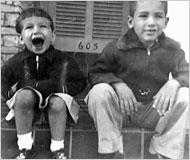 THE NEW YORK TIMES BOOK REVIEW
THE NEW YORK TIMES BOOK REVIEW
June 29, 2008
Brother, Who Art Thou?
By JAMES PANERO
A review of 'APPLES AND ORANGES: My Brother and Me, Lost and Found,' by Marie Brenner. (Illustrated. 268 pp. Sarah Crichton Books/Farrar, Straus & Giroux. $24.)
If Marie Brenner and her brother, Carl, can learn to love each other, there might be hope for our divided America after all. She’s a hot-shot writer at large for Vanity Fair, an investigative journalist known for taking down corporations; her exposé of the tobacco industry became the 1999 movie “The Insider.” He is an apple farmer in Washington State with the N.R.A. sticker on his truck who complains about his sister’s “A.C.L.U. friends in New York.” Illness turns out to be this family’s cure. Carl is discovered to have cancer, and Marie flies to apple country to try to save him.
In less capable hands, a memoir of such reconciliation might become a tired on-the-road travelogue or, worse, a bedside tear-jerker. But in “Apples and Oranges,” Marie Brenner has delivered a majestic little book. She deepens a tragicomic story into a meditation on family and fate.
“Our relationship is like tangled fishing line. We are defined by each other and against each other, a red state and a blue state, yin and yang.” The history of sibling warfare between these Brenners goes back to childhood. When she was 3, Carl pushed Marie out a window, sending her to the hospital. In high school, Carl filled his room with “manuals of alleged Communists published by the John Birch Society” while Marie played Joan Baez records. One day Marie came home to find the records smashed. “She’s a subversive,” Carl told her. “I have it right here on my list.”
“Is anything in life an accident?” Marie asks. They both came from the same secular Jewish household, heirs to a chain of Texas discount stores called Solo Serve. So how could she become a liberal journalist in New York while her brother turned out to be a Bush-loving, Wagner-listening, evangelical “right-wing nut” growing apples on the other coast?
Marie Brenner brings the same journalistic arsenal to this question that she would normally reserve for an investigation of Big Tobacco. When her brother gets sick, research becomes her coping mechanism. “I am treating my brother as if he is a source,” she writes, “someone I have been assigned to interview.”
Brenner looks for answers in the relatively new science of sibling psychology. Questionable terrain, perhaps. “I want to investigate if sibling problems are passed down in families like blue eyes and brown hair,” she writes. She uncovers letters that reveal a rift between her father, Milton, and his sister Anita. “Did my father’s rage at his sister impact my relationship with Carl?” Anita went to Mexico to become an associate of Diego Rivera, Frida Kahlo and José Clemente Orozco; she posed for Edward Weston and knew Trotsky. Milton stayed in San Antonio to build up the company founded by their father, Isidor.
When Isidor left their mother for a much younger woman, Anita backed her father. Milton did not. “Don’t you see that you are laying the fuse for a tremendous bomb,” Anita asked Milton in 1932, “the results of which no one can foresee, and which will involve all of us?”
Marie hopes that understanding her father’s family can help her make sense of her own. “The term ‘coherent story’ keeps popping into my mind,” she writes. “Family therapists call this the genogram, the laying on of family theory.”
How do we end up the way we do? Marie is the compulsive rationalist looking for the missing piece in her brother’s story, the key to the mystery. Her faith, like Anita’s, is in enlightened salvation. “I was stitching facts out of what I learned, trying to come up with a grid to lock together all of the following events,” she writes. “Where was the pattern? How did it link?”
Like his father, Carl is ever the skeptic. “It doesn’t connect,” Carl responds. As soon as Marie develops a leitmotif, Carl undermines it. We are led to believe that Carl was in the Marines, where “officers are trained to run through smoke and fires.” Ah, we say, maybe that caused Carl’s adenocarcinoma. But this cannot be the case. “After all that tough-guy posturing in college,” Brenner writes, Carl “never got to the Marines.”
In Brenner’s sympathetic portrait, Carl becomes a nuanced conservative character. “Sometimes you do not get to understand everything,” she concludes. Family trumps politics, and Marie comes to accept her brother’s tough love. One day, brother and sister climb “through the Galas, up through the Bartletts, the valley stretched out before us. We’re standing in a row of saplings, just planted in this sandy loam soil that he has named after our father. The Milton bloc. ‘This is where I want my ashes scattered,’ he says. ‘Are you listening to me?’” Marie was listening closer than Carl ever imagined. His ashes are scattered throughout this mystical book.